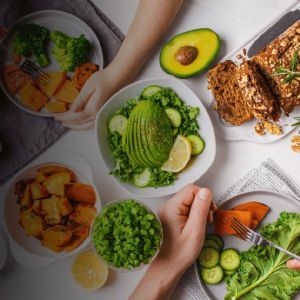Healthy Eating
A healthy lifestyle should be one of the fundamentals of every family
According Professor Neumyvakin (Dr N), most of the pathological conditions of the human body arise from malnutrition. Even a glass of water drunk at the wrong time can disrupt the activity of the gastrointestinal tract, which will undoubtedly affect the general state of health. He claimed that being healthy is not that difficult. A healthy lifestyle should be one of the fundamentals of every family. Here is some of his advice about healthy eating:

-
Do not overeat. The body should receive exactly as many calories as it spends on physical activities during the day and on the work of organs and systems, the human body is smart and responds correctly to its needs. According to Dr N, we eat four to five times more than we need to stay healthy. The rest of the "extra" food is the work of the doctors, the beginning of your illness. If not today, then tomorrow - but it will definitely be.
-
Do not eat if you are not hungry! To force yourself to eat and to push food into the body - is a crime against your health. If you're not hungry, it means that the previously eaten food has not yet digested.
-
Balance of products should be as: proteins (lean meat or fish, soybeans, legumes) - 20%, plant products (greens, fruits, vegetables, mainly raw) - 60%, cereals and bread (rye, bran), vegetable oil - 20 %. Protein should be consumed separately from carbohydrates.
-
Pay attention to how you eat. Have your meal in a calm atmosphere not on the run or in a hurry, eat your food slowly, each bite should be thoroughly chewed until semi-liquid, when the taste of the product becomes neutral. It helps your digestive system to absorb the nutrients as much as possible without energy costs. If you swallow your food without chewing it, the hydrochloric acid in the stomach would only slightly envelop the food without penetrating inside. Consequently, undigested food remains in the stomach and intestines and begins to rot, which will lead to sludging, metabolic disorders and development of various pathological conditions.
-
Drink a glass or two of water 15-20 minutes before meals to prevent overeating and prepare the digestive system for the intake of food. Water freely passes along the lesser curvature of the stomach and gathers in the intestines, where alkali accumulates. As a result, the water is not acidified by the stomach, but alkalized.
-
Do not drink liquids (tea, coffee) during meals or after the meal in order to maintain a high concentration of digestive juices and optimize digestive process. You can drink water in 1.5-2 hours after eating.
-
Eat dinner no later than 7 p.m. According to Dr N, if you regularly eat after 7 p.m., you will never be a healthy person. Generally, food is processed for two hours, so after 9 pm, the stomach should be free of food. It allows the pineal gland to produce melatonin and a growth hormone, which is then released at 11 o'clock. Growth hormone is a peptide that stimulates cell reproduction and regeneration, which is active while you sleep.
-
Temperature of the food is also very important: do not eat hot or too cold food because it will take energy to normalize the temperature or the food in the digestive system.
-
Rest for 20 minutes after each meal. This time is quite enough for the body to properly adjust to the digestion process.
-
Drink 1.5–2 liters of clean water per day on an empty stomach. Water is food, because three-quarters of us are actually water. Water should be pure because anything else doesn’t work for health (read more about importance of water here
-
Start implementing fasting days into your healthy lifestyle. According to Dr N, the level of harmful substances in the organs, particularly liver, sometimes exceeds the norm by 2x. Fasting one day a week could help with detoxification and natural removal of harmful, toxic substances from the body, and normalize the functional activity of internal organs. Choose the one that best fits your body: juice, kefir or pure water only.
